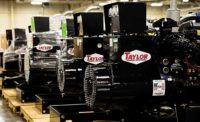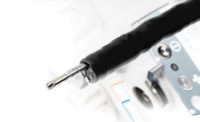Located in Portland, OR, AmFor Electronics Inc. has been manufacturing wire harnesses, cable assemblies, electrical panels and electromechanical assemblies since 1961. Its products can be found in cars, trucks, construction equipment and agricultural equipment. The company is also a leading manufacturer of testing equipment for automotive alternators and starters. Today, AmFor employs some 43 skilled workers and rings up more than $6 million in annual sales.
Getting to that point wasn’t easy. The company credits the adoption of lean manufacturing for enabling it to increase efficiencies, lower costs and offer better pricing to its customers. AmFor’s commitment to continuous improvement ensures high-quality production and maximizes responsiveness to customer-driven design changes.
The Oregon MEP (OMEP) helped get the company started on its lean journey. Initially, AmFor sought OMEP’s assistance to implement lean practices for its large-harness assembly line. AmFor’s goal was to increase flow, reduce backlog, improve output and increase capacity.
With OMEP’s help, AmFor applied the plan-do-check-act methodology to the line. AmFor worked with its existing team, promoting from within and creating a leadership group that created a visual pull system. AmFor created a one-piece flow line for large harnesses, implementing a layout that supported the flow from cutting the wire to shipping the finished product.
Additionally, AmFor worked with OMEP to establish daily stand-up meetings. During these meetings, the team covers production needs not just for the large harness line, but for the entire company. After reviewing key metrics, such as planned vs. actual production, staffing and daily shipments, the team discusses opportunities for improvement. Visual boards allow the 15-minute meetings to be successful and empower them to make important business decisions quickly.
AmFor established visual kanbans for each step in the assembly process. This simplified the process and reduced the need to expedite orders.
Regularly scheduled gemba walks throughout the plant ensure that everyone understands the process, flow and visual controls. Finally, AmFor created visual tool boards for commonly used tools; a visual tag system for shared tools; and a replenishment system for cleaning supplies.
“Working with OMEP has been a very educational experience for our employees. They are now able to break down our assembly procedures to essential processes and eliminate duplicate handling and batching,” says Jerry Koopman, AmFor’s president.
After implementing lean, AmFor reaped $243,000 in savings from reduced material waste and labor costs. Productivity improved by 30 percent, and sales have increased by 33 percent. The company also hired 13 new employees to support increased capacity.
OMEP’s success with AmFor is not unusual for MEP affiliates. The MEP is a public-private partnership dedicated to serving small and midsized manufacturers. With centers in all 50 states and Puerto Rico, MEP assisted 28,213 manufacturers in 2019, leading to $15.7 billion in sales, $1.5 billion in cost savings, $4.5 billion in new client investments, and creating or retaining 114,650 jobs.
MEP centers and partners have developed a wide range of services and initiatives to help manufacturers identify opportunities to accelerate and strengthen growth and competitiveness in the global marketplace. MEP centers work with manufacturers to develop new products, expand and diversify markets, improve processes, adopt new technology, conserve resources, and enhance value within supply chains. The program also serves as a bridge to other organizations and federal research labs.
As a public-private partnership, the program is delivering a high return on investment to taxpayers. For every dollar of federal investment, the MEP network generates $17.90 in new sales growth for manufacturers and $27 in new client investment. This translates into $2.3 billion in new sales annually. And, for every $1,501 of federal investment, the network creates or retains one manufacturing job.
Helping manufacturers get lean is a core competency for MEP affiliates. Here are a few of their stories. For more information on the MEP, visit www.nist.gov/mep.
LAST-MINUTE ASSISTANCE
Located in Denver, PA, Direct Wire and Cable Inc. (DWC) has been manufacturing cable sets for the welding, power rental and industrial cable markets since 1977. What began in the garage of the company’s founder and owner, Richard Witwer, has grown into an 85,000-square-foot state-ofthe- art factory with some 87 employees.
The company first engaged with MANTEC, the MEP center for southeastern Pennsylvania, in 2004 on a lean manufacturing project. Since then, the company regularly turns to MANTEC for guidance and assistance to achieve business objectives.
Most recently, a major customer required DWC to implement a robust quality management system (QMS) if it wanted to continue as a supplier or secure new work.
Senior management wanted a customized QMS that adhered to industry best practices and standards so that future initiatives would be easy to implement. MANTEC introduced DWC to a qualified software provider that implemented the new QMS and trained personnel to manage it.
Not long after, DWC lost two employees responsible for quality control. The timing was not good. With impending customer audits, DWC turned to MANTEC once again to provide extra manpower in less than a week to ensure that standards were met. With MANTEC’s help, the quality process was documented and improved, and the department structure was revised. MANTEC also played a role in hiring two highly qualified individuals to replace the ones who left. The transition was smooth, and the quality system was well documented.
With MANTEC’s help, DWC secured $2 million in retained and additional sales.
“MANTEC’s support during a critical transition allowed us to sustain manufacturing, improve our quality process, and establish a strong and stable quality department for the future,” says Wade Smith, vice president of operations at DWC. “MANTEC provides excellent service and often provides insights for other areas to improve.”
ACHIEVING ISO-9001 CERTIFICATION
For large manufacturers, acquiring an industry certification is not that big a deal. They can afford to throw money and manpower at the task. It’s much more difficult for small businesses, which have worries enough just meeting daily production goals.
Such was the case for AL-Tech Associates Inc., a small, woman-owned harness shop in Columbia, MD. Founded In 1978, AL-Tech had relied heavily on defense work, both as a prime contractor and a subcontractor. However, with the recent addition of a new production facility, the organization was looking to expand into new markets. Obtaining ISO-9001 certification for the new facility would enable the company to meet that goal. But, preparing and applying for ISO certification can be costly and timeconsuming, and it often requires outside resources and assistance.
AL-Tech reached out to the Maryland MEP center for help. The MD MEP team evaluated AL-Tech’s operation, pointing out where training was needed and how quality and production could be improved. MD MEP also helped AL-Tech obtain $50,000 in financial assistance through two programs offered by the State of Maryland: the Maryland Defense Diversification Assistance Program and the Partnership for Workforce Quality.
The funds enabled AL-Tech to implement the controls and training to achieve ISO-9001 certification and begin servicing new markets and customers. Three of the company’s mechanics received training, including IPC/ WHMA certification.
Throughout the process, MD MEP provided planning and support. MD MEP helped ALTech create a strategic plan that included direction on how to expand into new business verticals, such as aerospace, and how to leverage ISO certification for new business opportunities.
Almost immediately after achieving ISO certification, AL-Tech corralled three new customers. Moreover, the company now expects to triple sales during next three to five years.
“It has been a pleasure to work with MD MEP. They have been supportive, encouraging and a source of guidance throughout the journey to diversify,” says Matt Ash, Al-Tech’s CEO.
IATF CERTIFICATION WINS BUSINESS
Regardless of industry, parts suppliers worldwide adhere to quality standards of one form or another. It’s a way of assuring OEMs that the quality of their parts will be consistently high. But, what happens when the quality standard in the U.S. differs from the quality standard in, say, Germany or Japan?
Harmonizing these standards was the idea behind the creation of the International Automotive Task Force (IATF), a global coalition of automotive OEMs, suppliers and trade associations. Obtaining IATF certification will enable an automotive supplier to compete for business anywhere in the world.
This was the challenge faced recently by Antaya Technologies Corp., a supplier of wire harnesses, soldering equipment, and onglass power and signal connection systems. The company’s products are critical for such automotive amenities as rear-window defrosters and windshield antennas.
Although the Warwick, RI, company has been in business since 1987, it would need to achieve IATF 16949:2016 certification to continue uninterrupted service to the automotive industry.
Antaya called Polaris MEP, the Rhode Island MEP center, for help. The center provided an overview of the IATF 16949:2016 standard; a gap analysis report and internal audit of the company’s quality management system; and suggestions for improvement and revisions to company documents.
Antaya staff participated in two IATF leadership training sessions covering the global, strategic and operational factors behind the standard. In addition, 15 key individuals at the company participated in an eight-hour workshop covering the standard. The workshop focused on the core tools— such as advanced product quality planning, failure mode and effects analysis, production part approval process, and statistical process control—used in the automotive industry to fulfill the requirements of IATF 16949:2016.
“The comprehensive package that Polaris MEP provided allowed us to continue serving the automotive industry and remain focused on our customers’ needs,” says Donna Moschetti, human resources manager at Antaya.
Since achieving IATF 16949:2016 certification, Antaya has seen its sales increase by 18 percent.
ASSEMBLER INVESTS IN TRAINING
Located in St. Augustine, FL, Carlisle Interconnect Technologies manufactures cable assemblies, wire harnesses and highfrequency electrical connectors for a variety of industries, including aerospace, defense and medical.
The company began in 1940 and now boasts some 540 employees. Throughout its history, Carlisle has believed in investing in people and encouraging employees to become the best they can be through internal and external educational opportunities. In fact, the company has its own training team that focuses entirely on helping the workforce achieve technical and leadership skills.
To help meet that goal—without breaking the bank—Trent Schmidgall, Carlisle’s director of operations, often relies on FloridaMakes, the MEP center for Florida. The organization offers a variety of training programs on topics such as lean manufacturing, leadership and manufacturing processes. Programs are available for both front-line supervisors and line workers.
“Our employees are our best assets and investing in our workforce is key to our culture and a necessity for our business success,” says Chris Kool, a manager at Carlisle Interconnect. “Our industry requires high-quality products that cannot fail, and training is a prerequisite that we can’t jeopardize.
“The partnership with FloridaMakes gave us the opportunity to continue with our vision while reducing our manufacturing costs. This is truly a win-win situation for all, in this competitive market. Carlisle is now able to provide to all of our employees with more opportunities to learn new skills and knowledge.”






